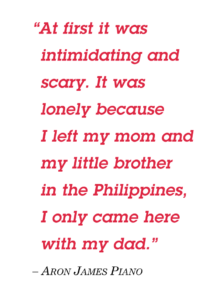
English Language Learner—The Triumphs and Challenges
Romelyn Joy Tabangcura | Maui High School
America—the land of the free and the home of the brave. Numerous families from different countries move to America in hopes of a better life and opportunities for their children. Moving into a different country comes with countless responsibilities and hardships to those who decide to take on a new life. Some of the many hardships include cultural differences and communication barriers in a new environment. These difficulties may become even more challenging to children who are not familiar with the English language whatsoever.
Fortunately, the emergence of the English Language Learner (ELL) program in support of the “No Child Left Behind Act” allows children that come from non-English speaking backgrounds or those who are not fluent in English, to receive an equal opportunity that paves a pathway to educational success. The objective of the ELL program varies upon different school curriculums but they all aspire to provide an ELL student with all the possible skills in order to reach their academic goals.

Lovely Salazar, a sophomore from Maui High School, describes her experience moving from the Philippines to the United States. “I felt really excited but also nervous. I knew that I had to learn many things especially the language. I had to learn to adjust since things are different.” To help Lovely settle into a new country, she was placed in the ELL program when she was in second grade and continued to stay for three years. The process of moving into a new country comes along with many challenges she had to overcome, one of them being the difficulty in making new friends due to communication barriers. “I did face difficulties making new friends. I couldn’t talk or understand English at first and it was really hard.” Although making new friends was a challenge for Lovely, the ELL program gave her hope as she found that “It was easier making friends with other ELL students because they too, came from another country and know what you’re struggling with. Other ELL students also spoke the same language as me so it was easier to communicate.” The ELL program was designed to help students achieve academic success but it also brought Lovely comfort from the hardships of moving into a new country. “It did make me comfortable because I knew that I wasn’t alone and it helped me learn more about English. The teachers were very helpful and they sometimes translated English to Ilocano when I didn’t understand some English words.” However, the ELL program has some advantages and disadvantages according to Lovely. “Some advantages was definitely learning more English words and getting better at understanding and speaking English. Some disadvantages was being taken out in the middle of the class to go to the program.” Although the ELL program has some mixed opinions from the public, Lovely thinks “It’s important because the ELL program helped me expand my English vocabulary. We would play these fun games while learning English and I really enjoyed it. It helped me structure how I write English sentences and I learned how to pronounce certain English words.”

Ghenesis Balaan, a junior from Maui High School who moved to the United States when he was in the 3rd grade and was placed in the ELL program for 2 years, shares his story of moving to a new country. “Moving to a new place alone is a scary idea but it’s a much different feeling when it comes to moving to a new country. When my dad told my sister and I that we were going to move to Hawai‘i, I definitely was not looking forward for this new experience. I would be leaving my friends whom I’ve known for basically my whole life to be a stranger at a new place in the middle of the Pacific.” Although he was not eager to move to a new environment, Ghenesis found reassurance through the ELL program since “My ELL teachers in Elementary School truly did make me feel more comfortable being in a new country because they helped me assimilate to school culture and also Hawaiian culture. My family could only help me to a certain point. The ELL program has helped boost my self esteem as an immigrant student when it came to friend-making and social interaction with fellow peers.” With the support of the ELL program, Ghenesis also found that “Making new friends wasn’t as bad as I imagined it was because thankfully Hawai‘i is such a diverse place that most of the friends I’ve made in 3rd grade were bilingual in Ilokano or at least understood somewhat. This took some of that scary feeling of making friends off. Even up to this day now that I am a junior at Maui High School, I’m still friends with those who approached me back in 3rd grade.” Migrating to a new country brings distress to students who move to a new setting because of the lengthy process of settling in but Ghenesis believes that “The ELL program provides a smooth transition to students moving from a different country. It took me a while to assimilate to the culture here in the islands and I am so thankful that the ELL program was created. The ELL program has helped me understand the culture here in Hawai‘i as well as provide academic assistance for school.”

Maui High School Junior Luzcilla Roflo who was placed in the ELL program when she was in the 4th grade, remembers her experience to moving to the United States as feeling sad because “I had to leave my Mom and my siblings behind. I was also oblivious as to what was going to happen next.” The process of making new friends in a whole new country was challenging for Luzcilla as she “faced difficulties in making new friends because of communication barriers. It was hard for me to make new friends due to the fact that I’m a shy person and the fact that I had an accent and didn’t really know English lessened my confidence.” Through her participation in the ELL program for about a year, she discovered that there were some pros and cons about the program. “Some advantages about the ELL program was that I was able to learn the English language much faster, learn basic subjects at school with their help and I met friends that spoke the same native language as me. There were also some disadvantages such as having to get out of class to go to an ELL class to get lessons on English which meant that I would miss parts of a lecture and having to stay in the ELL classroom before and after school.” The ELL program is designed to help students achieve their academic goals through lessons that best fit towards that individual and the school’s curriculum. Some of the many skills Luzcilla learned was “Perseverance. Despite not knowing most of English, I continued to persevere on learning it, studying and reading books just to catch up with everyone else. Being able to at least speak English fluently now, I learned that with hard work and persistence everything is possible.”

 Aron James Piano, a Junior at Maui High School, moved from the Philippines to the United States when he was in middle school and continued the ELL program for three years. Migrating to the United States, Aron found that “At first it was intimidating and scary. It was lonely because I left my mom and my little brother in the Philippines, I only came here with my dad. Days and days, I felt broken until I got the use of it and finally after two years of waiting, my mom and my little brother are here now living together.” Although Aron had a rough start moving into a new country, he found comfort through the ELL Program. “Having an ELL class before, was really my second home. There, I was taught a lot of things, including having more confidence. I was really shy and was not talking with anyone before because I was so scared that they would make fun of me because of where I came from and my accent. My teacher always told me, don’t let anyone judge you, you are unique and they don’t know anything about you. So each day I went to that class, I gained more and more confidence.” Although he gained self esteem through the program Aron believes that “Having a ELL program or class separated me from my original self to my future self, like leaving your older self just because you are bad in English and you need to be prepared and get better. I definitely understand that we immigrants need this and for us to be better in the future and be able to participate in any activities in our life but as long as you are dedicated and eager to learn you don’t need this.” To students who also have the similar experience as Aron, he shares some advice to upcoming ELL students. “Don’t be discouraged to yourself just because you are in ELL, having ELL will help you inside and outside school. Just because you are in ELL that doesn’t mean you are not good enough and you are bad in English. To me, it means an eagerness to learn and discover your self. Who knows you might be that someone that you wanted to be in the future! Remember, you and me are not perfect, if they belong here, you belong also!”
Aron James Piano, a Junior at Maui High School, moved from the Philippines to the United States when he was in middle school and continued the ELL program for three years. Migrating to the United States, Aron found that “At first it was intimidating and scary. It was lonely because I left my mom and my little brother in the Philippines, I only came here with my dad. Days and days, I felt broken until I got the use of it and finally after two years of waiting, my mom and my little brother are here now living together.” Although Aron had a rough start moving into a new country, he found comfort through the ELL Program. “Having an ELL class before, was really my second home. There, I was taught a lot of things, including having more confidence. I was really shy and was not talking with anyone before because I was so scared that they would make fun of me because of where I came from and my accent. My teacher always told me, don’t let anyone judge you, you are unique and they don’t know anything about you. So each day I went to that class, I gained more and more confidence.” Although he gained self esteem through the program Aron believes that “Having a ELL program or class separated me from my original self to my future self, like leaving your older self just because you are bad in English and you need to be prepared and get better. I definitely understand that we immigrants need this and for us to be better in the future and be able to participate in any activities in our life but as long as you are dedicated and eager to learn you don’t need this.” To students who also have the similar experience as Aron, he shares some advice to upcoming ELL students. “Don’t be discouraged to yourself just because you are in ELL, having ELL will help you inside and outside school. Just because you are in ELL that doesn’t mean you are not good enough and you are bad in English. To me, it means an eagerness to learn and discover your self. Who knows you might be that someone that you wanted to be in the future! Remember, you and me are not perfect, if they belong here, you belong also!”
 The ongoing challenges of settling into a new country may bring some hardships to students that are not familiar with the American-English language but thankfully the ELL program assist and support students to become a better version of themselves and reach their academic and social goals. Through this program, they are able to gain skill sets that will not only help them improve their English language speaking and learning skills but also provide the reassurance that they are not alone and that although the journey to settling in a new country is a difficult task, it is something that they can most definitely achieve through the ELL program.
The ongoing challenges of settling into a new country may bring some hardships to students that are not familiar with the American-English language but thankfully the ELL program assist and support students to become a better version of themselves and reach their academic and social goals. Through this program, they are able to gain skill sets that will not only help them improve their English language speaking and learning skills but also provide the reassurance that they are not alone and that although the journey to settling in a new country is a difficult task, it is something that they can most definitely achieve through the ELL program.
Google® Is Not Everything is a monthly column authored by high school students. The title of the column emphasizes that education is more than just googling a topic. Google® is a registered trademark.
This month’s guest columnist is Romelyn Joy Tabangcura, a junior at Maui High School taking part in Maui High’s ACOM and Health Services pathway. She is a member of Health Occupation Student of America (HOSA) for 3 years and has competed in Human Growth and Development and placed top 3 at states. She is also a part of INTERACT, a service club that works around the community. She aspires to become an anesthesiologist one day. She is a daughter of Romeo and Roselyn Tabangcura.
